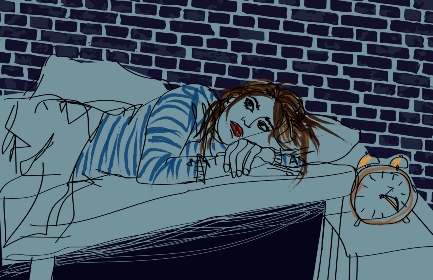
I don’t know about you, but I am NOT a good sleeper. I have never been a good sleeper, and I have always envied my friends (and my husband) who can sleep anywhere…and sleep like a rock!
I am a really light sleeper and sometimes have trouble falling back asleep if I wake up in the middle of the night. This problem worsened when I had babies who woke multiple times in the night to eat. I would always worry about when they would wake up next and when I would be needed. This only made my sleeping problems worse! It seems that my circadian rhythm has forever been thrown off. The longer I take to fall back asleep, the more anxious I become, and the more anxious I become, the harder it is to fall back asleep…and the cycle repeats itself.
After years of going through this, I have gleaned some helpful tips I’d like to offer anyone who suffers from sleep-related anxiety:
-
NO SCREENS! This applies to the half hour or so before bed UNTIL the morning! If you randomly wake up in the middle of the night, or get up to use the bathroom or to feed your baby, avoid looking at your phone or computer! I know many moms like to watch something or surf the web while they nurse in the middle of the night, but this will make falling asleep much more difficult. Say goodnight to your phone before you get ready for bed, and don’t say hello again until you are starting your day the next morning.
-
Make a to-do list before bed. Falling asleep is hard if you are busy thinking about all the things you have to do the next day. So make a list, prioritize, and take a look at your planner BEFORE you go to sleep. This way your mind will be at ease, not worrying about tomorrow.
-
Empty your bladder fully before bed. Try to stop drinking a couple hours before you go to sleep, and make sure you are comfortable with as empty a bladder as possible before hitting the pillow. This prevents a night-time trip which will interrupt your sleep.
-
Do not engage the mind if you wake up in the middle of the night! There was a great quote that came up on my Headspace app once. I don’t remember it exactly, but I think it was something along the lines of “Thoughts are not a problem. We just have to consider whether or not we want to engage with them.” This is EXACTLY what helps me when it comes to falling back asleep during the night. When I wake up in the middle of the night, I try as much as possible not to engage with my thoughts. Once I do, my mind will race and think about all the things I have to do, or all the things I am worried about, and it’s all downhill from there. I try to just get comfortable in bed and know that the only important thing at the moment is sleep—not whatever thoughts are begging for my attention.
-
Yoga/focus on your yoga breath. When people would say, “Oh, just focus on your breath. It will calm you down,” I used to roll my eyes. I found focusing on my breath to be impossible! THEN I STARTED DOING YOGA! Yoga utilizes a deeper kind of breathing, coordinated with movement. If I have trouble falling asleep at the beginning or in the middle of the night, engaging in yoga breath is much more helpful for me than just focusing on my breath’s natural rhythm. Yoga breath is deeper and results in a physiologically calming response. The more I do yoga, the more I am able to access this deeper, cleansing breathing. THIS kind of breathing helps me sleep.
-
Sleepwalk. This applies more when going to the bathroom in the middle of the night or getting up to feed a baby. It is best to engage your senses as little as possible. Keep it dark in the house. Let your eyelids stay soft and heavy. And like I mentioned before, do not engage with your thoughts. Think of it as sleepwalking. “I am not awake. I am just going to do this and then falling back asleep.”
-
TRUST yourself and your body! Much anxiety related to sleep is due to the fear that we cannot and will not sleep well for whatever reason. However, sleep is a basic need, right there next to food, water and shelter. Trust that your body is capable of fulfilling this basic need for itself, especially if you use good sleep hygiene and help facilitate a restful environment.
-
Consider a sleep aid. If you are doing all of the above listed items, and still have trouble sleeping, speak to your primary care physician about a sleep aid. Some examples include Unisom, Benadryl and Melatonin. These are generally safe and mild sleep aids which may give you the nudge you need to get back into a healthy sleep rhythm.
Happy Sleeping!